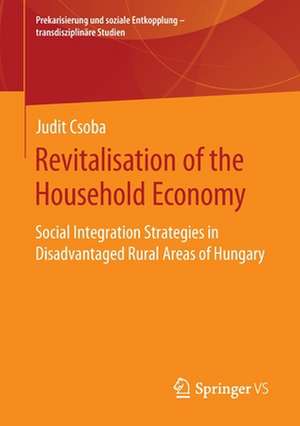Revitalisation of the Household Economy: Social Integration Strategies in Disadvantaged Rural Areas of Hungary: Prekarisierung und soziale Entkopplung – transdisziplinäre Studien
Autor Judit Csobaen Limba Engleză Paperback – 7 mai 2020
With the transformation of the role of the welfare state, the “social engagement” and “active participation” were taking the place of passive benefits. The importance of individual actions is becoming more and more prominent.
With the reduction of welfare benefits and expansion of the workfare model after the crisis of 2008, the main objective of the local integration programmes was to strengthen self-sufficiency of social group with precarious life situations in rural areas of Hungary. The purpose of this volume is to give a brief overview of the most important local integration programmes of the past quarter century, focusing on the social land programme. The analysis, summarising the results of an empirical study, presents the main turning points of the local integration models, the changing environmental conditions, as well as the adaptation strategies and the possible directions of development of local communities in Hungary.
Preț: 381.43 lei
Nou
Puncte Express: 572
Preț estimativ în valută:
72.99€ • 76.40$ • 60.75£
72.99€ • 76.40$ • 60.75£
Carte tipărită la comandă
Livrare economică 31 martie-14 aprilie
Preluare comenzi: 021 569.72.76
Specificații
ISBN-13: 9783658293499
ISBN-10: 3658293497
Pagini: 197
Ilustrații: XIII, 197 p. 3 illus., 2 illus. in color.
Dimensiuni: 148 x 210 mm
Greutate: 0.26 kg
Ediția:1st ed. 2020
Editura: Springer Fachmedien Wiesbaden
Colecția Springer VS
Seria Prekarisierung und soziale Entkopplung – transdisziplinäre Studien
Locul publicării:Wiesbaden, Germany
ISBN-10: 3658293497
Pagini: 197
Ilustrații: XIII, 197 p. 3 illus., 2 illus. in color.
Dimensiuni: 148 x 210 mm
Greutate: 0.26 kg
Ediția:1st ed. 2020
Editura: Springer Fachmedien Wiesbaden
Colecția Springer VS
Seria Prekarisierung und soziale Entkopplung – transdisziplinäre Studien
Locul publicării:Wiesbaden, Germany
Cuprins
Theoretical and research framework.- The economic, social, and political background behind the establishment and operation of the social land programme.- The historical roots and main phases of development of the social land programme.- The social land programme in terms of related literature.- The social land programme in the changing realm of social policy.- The operation and characteristics of the social land programme today.- The impact of the social land programme.- Integration models – complementing or competing with each other? The integration strategies of local society.- The characteristics of social cooperatives in Hungary.- Summary, conclusions.
Notă biografică
Dr. Judit Csoba is professor of Sociology and Social Policy at the University of Debrecen, Hungary.
Textul de pe ultima copertă
With the transformation of the role of the welfare state, the “social engagement” and “active participation” were taking the place of passive benefits. The importance of individual actions is becoming more and more prominent.
With the reduction of welfare benefits and expansion of the workfare model after the crisis of 2008, the main objective of the local integration programmes was to strengthen self-sufficiency of social group with precarious life situations in rural areas of Hungary. The purpose of this volume is to give a brief overview of the most important local integration programmes of the past quarter century, focusing on the social land programme. The analysis, summarising the results of an empirical study, presents the main turning points of the local integration models, the changing environmental conditions, as well as the adaptation strategies and the possible directions of development of local communities in Hungary.
Contents
• Theoretical and research framework
• The economic, social, and political background behind the establishment and operation of the social land programme
• The historical roots and main phases of development of the social land programme
• The social land programme in terms of related literature
• The social land programme in the changing realm of social policy
• The operation and characteristics of the social land programme today
• The impact of the social land programme
• The integration strategies of local society
•The characteristics of social cooperatives in Hungary
Audience
We recommend this volume to those who are interested in attempts to innovate welfare systems, who are interested in models for revitalizing local communities, and who are themselves involved – as organizers, implementers, researchers, or even as interested supporters of ruraleconomy and society – in the process of restructuring the rural economy and society.
The Author
Dr. Judit Csoba is professor of Sociology and Social Policy at the University of Debrecen, Hungary.
Caracteristici
Study about the social transformations in Hungry after the reducing of the welfare benefits Insights into the precarious life situations in rural areas of Hungary Overview of the most important local integration programs











